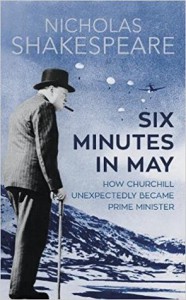A chummy history of how Churchill became Prime Minister

The selection of Winston Churchill as Neville Chamberlain's successor in May 1940 is regarded today as one of the most pivotal moments of the 20th century. With his elevation to the premiership Britain was committed to a course of action in the Second World War that ended with victory over Nazi Germany. Given his role in the Allied triumph and subsequent anointing as the greatest Briton ever, such a choice can be perceived as inevitable. Yet was it?
One of the great merits of Nicholas Shakespeare's account of the events surrounding the decision is in his detailing the views of the key actors in the spring of 1940 and the choices available to them. In the process, not only does he demonstrate that Churchill's selection was far from ordained, but he also shows that it was more than a simple choice between Churchill and Lord Halifax traditionally described in most accounts of the event. As Shakespeare explains, ministers and Members of Parliament had several alternatives available to them. For many of them, Churchill was an unacceptable choice for the top post given his recklessness and adventurism, while others seemed much more appealing candidates. Even the very notion that Chamberlain needed to be replaced because of the military debacle in Norway the month before was not generally accepted, and only emerged over the course of the "Norway debate" and the subsequent division that exposed the weakness of Chamberlain's support.
To detail the events of May 1940 and uncover the thinking of the various people involved Shakespeare went beyond the traditional accounts in memoirs and biographies and undertook additional archival research and interviews. This he knits together in a narrative to which he brings all his skills as a novelist, making for an account that is highly engaging. By comparing the at times conflicting accounts and retrospective explanations, he has produced a very detailed description of how it came down in the end to Churchill. Yet it is also an incredibly chummy account, focusing almost exclusively upon the actions and decisions of a select group of elite men (and even a couple of women). While this is understandable given the small circle of people in politics and media at the time, the weaknesses in this approach are more evident in the account of the Norway disaster that precedes it. Given its importance to the events that followed Shakespeare spends a third of the book describing its failings, yet his account of events rarely strays beyond the experiences of key officers and government officials, creating the impression that it was merely their personal experiences which drove their objections to Chamberlain rather than the broader defeat that informed their criticisms of his handling of the war.
By narrowing his focus to a group of elite figures (one that includes his own uncle), Shakespeare trivializes the motivations of many of the men involved in the decision to turn out Chamberlain. It's a glaring flaw in what is in many respects an excellent book, one that details the chain of events that would define the course of world history. It is especially unfortunate, given that Shakespeare's extensive research and ability as a writer have produced what is the best account yet of how Churchill became prime minister in those fateful weeks in the spring of 1940. Its weaknesses, however, cause it to fall short of the definitive account it could have been with just a broadening of its scope.
 3
3






